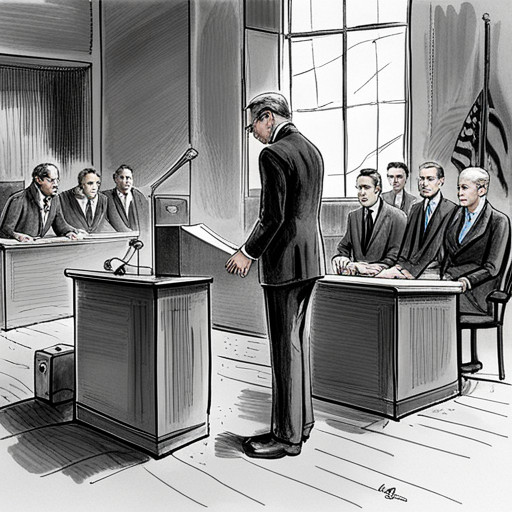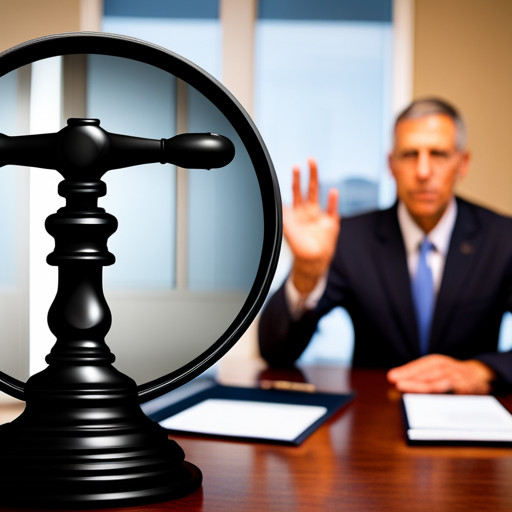Path to Justice Fighting Camp Lejeune Battles with an Expert Lawyer
Like navigating a complex labyrinth, the pursuit of justice in the Camp Lejeune legal battles requires expert guidance. This article elucidates the crucial role of lawyers in these cases and the legal complexities involved.

A skilled attorney can make a significant difference in the pursuit of justice at Camp Lejeune. Through examination of successful lawsuits and the power of evidence, this article aims to provide a comprehensive understanding of the ongoing struggle for justice at Camp Lejeune.
Key Takeaways
- Allegations of contaminated drinking water at Camp Lejeune have led to health issues reported by veterans and their families.
- The Department of Veterans Affairs acknowledges 15 conditions connected to the contaminated water, but establishing a direct causal link between the water and specific health conditions can be challenging.
- A lawyer's role in the Camp Lejeune battles includes investigating the case, formulating a legal strategy, executing the strategy ethically, and maintaining regular communication with the client.
- The legal complexities of Camp Lejeune cases involve determining liability, procuring substantial evidence, negotiating fair compensation, and navigating legislative implications related to environmental contamination, personal injury, and public health.
Understanding the Camp Lejeune Dispute

The Camp Lejeune dispute revolves around the allegations of contaminated drinking water at the military base, which is believed to have caused numerous health issues among veterans and their families. The contamination at Camp Lejeune, one of the largest Marine Corps bases in the United States, occurred between the 1950s and the 1980s. During this period, drinking water was polluted with industrial solvents and other chemicals, a situation that was not addressed until the mid-1980s.
The health implications of this contamination have been severe and long-lasting. Decades after exposure, veterans and their families have reported a range of illnesses and ailments. This includes fifteen conditions that the Department of Veterans Affairs acknowledges are connected to the contaminated water, such as leukemia, kidney cancer, bladder cancer, liver disease, and Parkinson's disease.
The contaminated water effects have been far-reaching. Not only have they led to debilitating health issues, but they have also resulted in complex legal disputes. Despite the recognition of health issues by the Department of Veterans Affairs, many veterans and their families have faced significant challenges in seeking compensation for their suffering. This is due in part to the difficulty in establishing a direct causal link between the contaminated water and the onset of specific health conditions.
Thus, the Camp Lejeune dispute is not only a public health issue but also a legal quagmire. The path to justice for those affected is fraught with challenges, demanding a deep understanding of both the health implications and the legal complexities surrounding the contaminated water effects.
Role of a Lawyer in the Camp Lejeune Battles

In these legal confrontations, a professional in the field of law plays a critical role, providing necessary guidance and representation for those seeking compensation. The Camp Lejeune disputes demonstrate the significance of a proficient legal practitioner, who, with an in-depth understanding of both, the legal complexities and the client's case, can navigate these challenging legal waters. The adherence to Legal Ethics and effective Client Communication is paramount in such cases.
In the role of a lawyer, there are four primary responsibilities to be highlighted:
- Investigation of the case to determine the validity of the claim
- Formulation of a legal strategy that aligns with the client's objectives
- Execution of the legal strategy while adhering to legal ethics
- Regular and transparent communication with the client regarding the case progress
The lawyer's duty extends beyond the courtroom, where they are expected to conduct extensive research to build a strong case. They are responsible for taking the time to understand the client's situation fully, determining the best legal strategy, and guiding the client through the complex litigation process.
Effective Client Communication is vital in ensuring that the client is aware of the progress of the case, can make informed decisions, and feels supported during this challenging period. Emphasis on Legal Ethics ensures the lawyer operates within the bounds of the law, maintains a professional standard, and respects the rights of all parties involved. This balance of effective communication, adherence to legal ethics, and the pursuit of justice is crucial in the role of a lawyer in the Camp Lejeune disputes.
The Legal Complexities Involved in Camp Lejeune Cases

Legal complexities involved in such cases often encompass multifaceted aspects, including the determination of liability, procurement of substantial evidence, and the negotiation of fair compensation. Legislative implications play a crucial role in shaping the course of these cases. The rules, regulations, and laws pertaining to environmental contamination, personal injury, and public health are of paramount importance. They not only define the parameters of liability but also influence the extent and nature of compensations.
The cornerstone of these lawsuits is often the procurement of substantial evidence. This is where medical documentation becomes indispensable. It serves as concrete proof of the health damage inflicted by the contamination at Camp Lejeune. It establishes a direct link between the exposure to toxic chemicals and the resultant health conditions, thereby substantiating the claims of the plaintiffs.
Moreover, medical documentation is instrumental in the negotiation of fair compensation. It provides a quantifiable measure of the damage suffered, forming the basis of the compensation demanded. It assists in the accurate calculation of medical expenses, loss of earnings, pain, suffering, and the cost of future care, thereby ensuring a comprehensive evaluation of the compensation deserved.
Notwithstanding the above, the interpretation of legislative implications and the evaluation of medical documentation is a challenging task. It demands an in-depth understanding of the law and a meticulous analysis of medical records. As such, the role of an expert lawyer becomes indispensable. The expert lawyer navigates the intricate maze of legal complexities, ensuring the path to justice for the victims of Camp Lejeune.
How an Expert Lawyer Can Make a Difference

Navigating through the complex web of laws and regulations, a proficient attorney can significantly influence the outcome of such cases by accurately interpreting legislative implications and meticulously analyzing medical documentation. The importance of lawyer's competency and adherence to legal ethics in these cases cannot be overstated. Expert lawyers delve into the intricate details of these cases, ensuring that every piece of evidence is explored for its potential impact on the case.
In the context of Camp Lejeune cases, the lawyer's role extends beyond the courtroom. It involves, among other things:
- Thorough investigation of the client's exposure history.
- Detailed analysis of medical records to establish a connection between the exposure and the health condition.
- In-depth understanding of the scientific studies linking contaminants at Camp Lejeune to specific illnesses.
- Persistent advocacy for the client, ensuring that their rights are upheld throughout the process.
Lawyer's competency is not only about legal knowledge but also about the ability to communicate effectively, negotiate assertively, and think strategically. This involves understanding the nuances of the law, being up-to-date with the latest court rulings, and being able to use this information to build a strong case.
Legal ethics, on the other hand, ensures that the lawyer maintains a high standard of professional conduct. This includes maintaining confidentiality, avoiding conflicts of interest, and representing the client to the best of their ability.
Case Study: Successful Camp Lejeune Lawsuits

The subsequent discourse will delve into the intricacies of winning lawsuit strategies, underscored by real case examples from Camp Lejeune.
A meticulous examination of specific cases will illuminate the strategic maneuvers that facilitated successful outcomes in the courtroom.
Additionally, a comprehensive analysis of these real-world instances will provide a deeper understanding of the practical application of theoretical legal concepts and tactics.
Winning Lawsuit Strategies
Successful outcomes in Camp Lejeune litigation often hinge on well-crafted strategies that expert lawyers employ. These strategies involve a keen understanding of legal loopholes and thorough plaintiff preparation.
In-depth research to identify potential legal loopholes that can be exploited to the advantage of the plaintiff.
Meticulous preparation of the plaintiff for deposition and trial, ensuring that they are well-versed in every aspect of their case.
Detailed investigation of the facts of the case, gathering all necessary evidence and documentation to strengthen the plaintiff's claim.
Effective communication with the court and opposing counsel to ensure the plaintiff's rights are protected throughout the litigation process.
Thus, these strategies underpin successful legal outcomes in Camp Lejeune cases.
Real Case Examples
Illustrative examples from real cases can provide a concrete understanding of how these strategies are put into practice.
Particularly, the Camp Lejeune battles reveal the significance of expert legal representation in overcoming legal loopholes.
One case involved a victim who sought compensation for severe health issues caused by contaminated water. Initially, the claim was dismissed due to the Feres Doctrine, a legal loophole that bars military personnel from suing the government.
However, an expert lawyer successfully argued that the victim was not aware of the contamination during service, thus, not falling under the doctrine. Consequently, the court acknowledged the victim's right to compensation.
Such instances elucidate the indispensability of lawyers in navigating complex legal landscapes to ensure victim compensation.
The Importance of Specialized Legal Support in Environmental Cases

Specialized legal support plays a crucial role in environmental cases, providing expert guidance through complex legal processes and regulations. Given the intricacies of Environmental Law Challenges, it is essential that practitioners possess Specialized Legal Training, enabling them to navigate these often convoluted cases effectively.
The importance of specialized legal support in environmental cases is emphasized by the following points:
- Expert knowledge of environmental regulations: Specialized legal support ensures comprehensive understanding of the nuances of environmental laws and regulations, pivotal in developing effective case strategies.
- Proficient handling of scientific data: As environmental cases often involve complex scientific data, specialized legal training is necessary to interpret and present this data accurately and convincingly.
- Strategic negotiation skills: Specialized legal support equips practitioners with the necessary skills to negotiate on behalf of their clients, often leading to more favorable outcomes.
- Understanding of stakeholder interests: Environmental cases often involve multiple parties with conflicting interests. Specialized legal training facilitates the understanding and balancing of these interests.
In the milieu of environmental law, the stakes are high. With potential impacts on public health and the environment, it is crucial to ensure accurate interpretation and application of the law. Therefore, specialized legal support is not merely beneficial; it is indispensable. It facilitates thorough understanding of the intricacies of the law, strategic negotiation, and proficient handling of scientific data. Furthermore, it aids in understanding the interests of various stakeholders, which can significantly influence the outcome of a case.
This underscores the necessity of specialized legal training in these complex, high-stakes cases.
Preparing for Your Camp Lejeune Battle: A Lawyer’s Perspective

Preparation for legal confrontations related to environmental issues, as viewed from a legal practitioner's perspective, requires a deep understanding of the specific case, such as those concerning the well-known military base associated with water contamination incidents. Thorough knowledge of the facts, a strong command of the applicable laws, and an ability to navigate legal loopholes are essential for effective veteran advocacy in these complex cases.
A detailed investigation into the nature of the contamination, the timeline of exposure, and the health consequences experienced by the veterans is crucial. This information is used to establish a strong link between the contamination and the health problems suffered by the veterans, which is a critical element in these cases.
The following table presents some key aspects of such preparation, demonstrating the complexity and depth of the task at hand.
| Aspect | Importance | Challenge |
|---|---|---|
| Detailed investigation | Establishes the link between contamination and health problems | Requires technical expertise |
| Legal knowledge | Essential for navigating the legal system | Legal loopholes can complicate the case |
| Veteran advocacy | Ensures the rights and interests of veterans are protected | Veterans often face significant legal and bureaucratic hurdles |
The Legal Process Explained: Filing a Camp Lejeune Lawsuit

Having appraised the pivotal role of an expert lawyer in preparing for a Camp Lejeune battle, it is expedient to now delve into the legal intricacies of filing a lawsuit. This phase, often characterized by claiming compensation and amplifying legal rights awareness, is crucial in the pursuit of justice for the affected individuals.
At the onset, a lawsuit commences with the filing of a complaint, which registers the plaintiff's claim against the defendant. This document outlines the legal grounds for the lawsuit, the legal remedy being sought, and the facts supporting the claim. Following this, the defendant is served with the complaint and a summons, therein commencing the legal process.
Claiming compensation, in particular, is a critical component of this process. This denotes the financial recompense sought by the plaintiff for the harm suffered, with the aim of returning them to the position they would have been in, had the misconduct not occurred. However, the process of claiming compensation is not without complexity, necessitating a comprehensive understanding of one's legal rights.
The following factors are influential in determining the amount of compensation to claim:
- The severity and duration of the harm suffered
- The cost of medical expenses incurred, both past and future
- The loss of earnings and earning capacity
- The degree of negligence or wrongdoing by the defendant
Legal rights awareness is pivotal in ensuring a fair and just process. This encompasses knowledge of the legal process, the rights and obligations of the parties involved, and the available legal remedies. All these elements contribute to a stronger understanding of the path to justice, enabling individuals to navigate the legal landscape of the Camp Lejeune battle with greater confidence.
Navigating the Challenges of Camp Lejeune Litigation

In the pursuit of justice for those impacted by the Camp Lejeune water contamination scandal, it is imperative to comprehend the complexities and legal hurdles that accompany such litigation. Apart from understanding the legal landscape, the selection of apt legal representation, skilled in handling such intricate matters, is equally crucial.
This discussion will delve into the specifics of these legal obstacles, as well as the criteria that should guide the choice of expert representation in Camp Lejeune lawsuits.
Understanding Legal Obstacles
Legal obstacles often present significant challenges in the pursuit of justice, particularly in complex cases such as those involving Camp Lejeune. These hurdles can be intensified by existing legal loopholes and judicial hurdles, which can complicate the litigation process.
Legal loopholes: These can allow liable parties to evade responsibility.
Judicial hurdles: Complexities such as jurisdictional issues may arise, potentially delaying proceedings.
Statute of limitations: This legal provision can limit the timeframe within which a lawsuit can be filed.
Burden of proof: The plaintiff must establish a credible link between their ailment and the alleged contamination.
Understanding these obstacles is essential for navigating the litigation process effectively. Consequently, expert legal assistance is often crucial in overcoming these challenges and pursuing justice.
Choosing Expert Representation
Selection of skilled representation is a critical step in navigating complex litigation processes, particularly when confronting significant legal obstacles. Part of this process involves a thorough legal fees comparison. A detailed examination of potential costs is essential to ensure that the selected legal professional can provide adequate support without causing undue financial strain.
The lawyer selection criteria should also encompass the professional's track record in dealing with similar cases, their understanding of the specific legal obstacles at hand, and their capacity to effectively communicate complex legal concepts. Furthermore, the selection should consider the lawyer's level of specialization. A legal professional with a keen focus on litigation related to the Camp Lejeune battles, for instance, is likely to provide more effective representation than a general practitioner.
The Power of Evidence in Camp Lejeune Lawsuits

The role of compelling evidence in Camp Lejeune lawsuits cannot be understated, as it often serves as the crucial determinant in securing justice. The process of evidence collection, particularly the gathering and preservation of medical records, plays an integral part in substantiating the claims of plaintiffs in these legal battles.
Medical records serve as the backbone of any health-related lawsuit as they provide a factual basis for the ill effects suffered by the victims. These records are especially of paramount importance in lawsuits involving Camp Lejeune, given the nature of the alleged contamination and the range of health effects it has purportedly caused.
The importance of evidence collection and the role of medical records in Camp Lejeune lawsuits can be emphasized through the following points:
- Medical records act as irrefutable proof of a plaintiff's health condition, substantiating claims of illness or disease.
- A comprehensive collection of evidence, including medical records, can strengthen a plaintiff's case and improve the chances of a successful lawsuit.
- Evidence collection may also include environmental reports, witness testimonies, and historical documents, all of which contribute to a well-rounded case.
- The importance of maintaining accurate and thorough medical records cannot be overstated, as these documents can provide chronologies of symptoms, diagnoses, and treatments, crucial in proving causality in lawsuits.
An in-depth, factual investigation into the potential health impacts of the contamination can further underscore the importance of evidence collection and medical records in these lawsuits. This detail-oriented approach can significantly aid in the fight for justice for the victims of Camp Lejeune.
The Role of Settlements in Camp Lejeune Cases

Having previously explored the indispensable role of evidence in Camp Lejeune lawsuits, the discourse now transitions into the equally significant aspect of settlement negotiations. The pursuit of justice in these cases often culminates in a settlement, wherein the defendant agrees to provide victim compensation, thereby resolving the lawsuit.
The path to a settlement is paved through meticulous, often intense, negotiations, which require a deep understanding of both the legal and medical facets of the respective case. It involves the evaluation of the strength of the victim's claim, the estimation of a reasonable compensation amount, and the strategic use of negotiation techniques.
The table below provides a snapshot of the typical settlement negotiation process in a Camp Lejeune lawsuit, with details on the steps involved, their purpose, and the expected outcomes:
| Step | Purpose | Expected Outcome |
| Review of Medical and Legal Evidence | To establish the strength of the victim's claim and the extent of damages incurred | Provides a basis for determining the initial demand for compensation |
| Initial Demand and Response | The victim's lawyer presents the demand for compensation to the defendant's representatives | Initiates the negotiation process |
| Negotiation | Both parties discuss and adjust their demands and offers | Progress towards a mutually agreeable compensation amount |
| Settlement Agreement | Formalizes the agreed upon compensation amount | Ensures victim compensation and resolves the lawsuit |
Conclusively, the role of settlements in Camp Lejeune cases is not merely limited to the provision of victim compensation. They also serve to bring closure to the victims and their families, who have suffered due to the negligence of the responsible parties. In essence, they represent the final step in the path to justice.
Lessons Learned From Past Camp Lejeune Legal Battles

An examination of previous case studies concerning legal battles related to Camp Lejeune provides a wealth of knowledge and strategical insights. The implementation of these learned strategies can potentially enhance future case outcomes and strengthen the legal standing of those affected by the Camp Lejeune contamination incident.
This discussion will delve into these historical cases, dissect their strategies, and explore how these lessons can be integrated into future legal proceedings for maximum effectiveness.
Previous Case Studies
Previous case studies provide invaluable insights into the strategies and approaches utilized by expert lawyers in Camp Lejeune battles. The focus often revolves around victim compensation and understanding the health impacts caused by exposure to contaminated water.
In this context, four key strategies emerge:
- Emphasizing on the Severity of Health Impacts: Detailed medical reports are used to demonstrate the severity of health conditions developed due to exposure.
- Proving Negligence: Lawyers often argue on the basis of the military's failure to meet health and safety regulations.
- Arguing for Adequate Compensation: The focus is on ensuring victims receive fair compensation for their suffering, medical expenses, and loss of income.
- Utilizing Precedents: Lawyers leverage previous successful cases to strengthen their arguments and strategies.
Implementing Learned Strategies
Implementation of the gleaned strategies involves careful application of the key tactics observed in past cases. This includes emphasizing the severity of health impacts, proving negligence, arguing for adequate compensation, and leveraging precedents.
Strategic negotiation plays a vital role in this process, requiring detailed understanding of litigation tactics to develop a convincing argument. The focus is often directed towards establishing a cause-and-effect relationship between the negligent act and the resultant damage.
To strengthen the case, previous legal precedents are frequently invoked, providing a compelling framework for establishing negligence and demanding rightful compensation. Furthermore, the gravity of health impacts is underscored to substantiate the plea for proportionate compensation.
Thus, a meticulous and strategic application of these learned strategies is instrumental in achieving justice.
Future Perspectives: The Ongoing Struggle for Justice at Camp Lejeune

Future perspectives indicate continued efforts are necessary in the struggle for justice at Camp Lejeune. The focus is on the push for policy changes that can address the health concerns of exposed veterans. As a result of decades-long water contamination, many veterans and their families experienced significant health issues. Veterans' advocacy groups have been instrumental in pushing for recognition and compensation for those affected.
These efforts have led to a number of important strides, including the provision of health benefits to affected veterans by the Department of Veterans Affairs. However, there still remains much to be achieved. The journey toward justice requires continuous efforts in several key areas:
- Improvement of policies that recognize and address the health issues related to environmental exposures at military bases.
- Stronger veterans' advocacy to ensure all affected individuals are adequately compensated.
- More rigorous scientific research to conclusively establish links between the contamination and the reported health issues.
- Greater transparency and accountability from the military and related institutions.
The policy changes are crucial to ensure justice for those affected by the contamination. However, they must be accompanied by consistent advocacy and research. The demand for greater transparency and accountability from military institutions can only be met through collective action. It is an ongoing battle that requires commitment and resilience from all stakeholders.
The future, while challenging, holds promise for justice at Camp Lejeune if these efforts are sustained.
Frequently Asked Questions
What Is the Average Duration of a Camp Lejeune Lawsuit?
The average duration of a Camp Lejeune lawsuit is subject to numerous variables, including the specifics of the case, the nature of the lawsuit complications, and the intricacy of the settlement procedures. Thus, it is challenging to establish a precise timeline.
However, many lawsuits can span from several months to many years, underscoring the necessity for thorough preparation and expert legal counsel for optimum outcomes.
Further research is required to determine more exact timelines.
Are There Any Specific Health Conditions That Are Commonly Reported Among Camp Lejeune Victims?
Research reveals a significant number of health conditions reported among Camp Lejeune victims. These predominantly include Lejeune-related cancers such as kidney, liver, lung, and bladder cancers. Furthermore, evidence shows increased rates of acute myeloid leukemia and multiple myeloma.
Veterans' advocacy groups highlight the growing incidence of these conditions among affected members. Investigations continue to unveil the extent of this health crisis, emphasizing the need for further research and stronger measures for victims' rights and compensation.
Can a Lawyer From Another State Represent Me in a Camp Lejeune Case?
Interstate legal representation is feasible in certain instances. However, it is contingent on specific State Bar limitations. For a lawyer from a different state to represent a client in a Camp Lejeune case, they must be licensed in the state where the case is being pursued or seek permission for pro hac vice admission.
These regulations ensure the lawyer is competent to practice law in that jurisdiction, thereby maintaining the integrity of the legal profession.
How Much Would It Typically Cost to Hire a Lawyer for a Camp Lejeune Case?
The cost of legal representation in a Camp Lejeune case varies significantly, largely determined by factors such as legal fee negotiations and lawyer's experience.
While some attorneys might offer pro bono representation, others could charge hourly rates or work on a contingency basis.
Additionally, costs could escalate if the case progresses to court.
Therefore, a clear understanding of the potential financial commitment is vital before engaging legal services in such complex environmental litigation.
What Are the Psychological Impacts on the Victims Involved in the Camp Lejeune Cases?
Psychological impacts on victims involved in Camp Lejeune cases are profound. Exposure to such incidents often precipitates traumatic stress disorders, necessitating the implementation of trauma coping mechanisms.
Furthermore, the importance of a robust support system is underscored, as it aids in mitigating the deleterious effects of psychological distress.
These impacts extend beyond the individual, affecting familial and societal dynamics, and thus, warrant comprehensive psychological intervention strategies.
Conclusion
In the quest for justice, the labyrinth of legal complexities surrounding Camp Lejeune cases remains daunting. Irony, it seems, lays in the fact that those who served their nation are now battling their own government for acknowledgment and recompense.
The role of expert lawyers, evidence, and settlements in these lawsuits cannot be overstated. Lessons derived from past legal battles indicate a hard-fought struggle, yet the pursuit for justice at Camp Lejeune continues undeterred.

This post has been generated by AI and was not reviewed by editors. This is Not legal advice. Please consult with an attorney.




